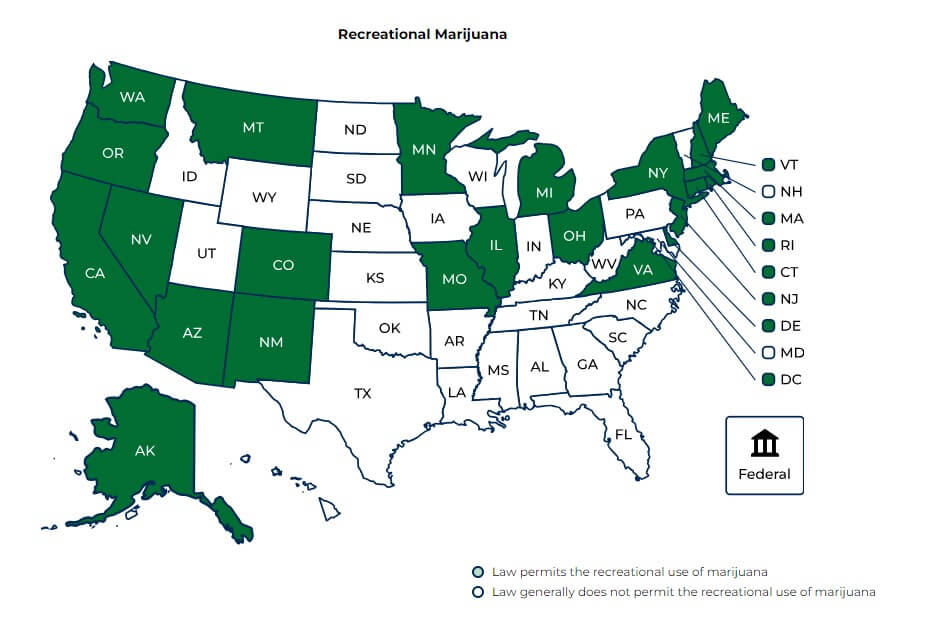On November 7, 2023, Ohio voters made Ohio the twenty-fourth state in the United States to legalize the recreational possession and use of marijuana. Ohio Revised Code (R.C.) Section 3780, which is subject to amendment by the Ohio General Assembly, will go into effect on December 7, 2023, but it will take months to establish regulations that more clearly define the law’s requirements.
For employers, Ohio’s law does not contain an anti-discrimination or employment protection provision for marijuana, as some states’ marijuana laws do. In those states, employers may not discriminate or otherwise take adverse employment action against employees based solely on medical marijuana cardholder status or recreational marijuana use. Likewise, the statute does not currently provide any provisions to reduce employment barriers for past users of marijuana, such as requiring past convictions to be sealed, expunged, or otherwise not considered in the hiring process.
Strategically, Ohio employers should remain diligent in keeping marijuana issues within the lens of recreational use, rather than inadvertently obtaining knowledge of medical cardholder status, which could trigger disability considerations. By way of example, if an individual tests positive for marijuana and does not disclose medical cardholder status, employers may want to refrain from asking if the person is a cardholder. Stated more plainly, employers have greater flexibility in managing personnel issues with recreational users in Ohio than with medical cardholders.
Following are seven key considerations for employers as they evaluate their Ohio policies and practices in light of the new legislation:
1. Employers may set their own rules regarding marijuana use, including maintaining zero-tolerance policies, without violating R.C. 3780.
2. Employers may continue to discipline, refuse to hire, or discharge employees for marijuana use or for being under the influence of marijuana at work. Although the law does not require it, employers may wish to make the expectations clear in a written policy. However, employers may want to note that a drug test does not measure impairment.
3. Employers may continue to prohibit marijuana use as part of their drug-free workplace programs and may continue to test applicants and current employees for marijuana use. However, employers will likely want to continue to evaluate positive marijuana tests carefully to determine the legal risk profile in each individual scenario. For more information regarding the federal Occupational Safety and Health Administration’s (OSHA) position regarding post-accident drug testing specifically, please see “Majority of States Have Legalized Marijuana, but OSHA’s Post-Incident Drug-Testing Guidance Hasn’t Changed.”
4. An employer’s decision to terminate the employment of an employee for marijuana use under a workplace policy is considered “just cause” for purposes of unemployment compensation.
5. Drug tests cannot yet accurately determine whether someone is under the influence of marijuana and have varying lookback windows of detection depending on the drug test specimen. Accordingly, decisions about whether an individual is under the influence at work require a combination of drug testing and trained observance in order to create a factual narrative and inference of impairment. Employers may want to make sure that supervisors are adequately trained in reasonable suspicion observations.
6. Nothing in the law alters the U.S. Department of Transportation’s or the Federal Aviation Administration’s drug-free workplace requirements.
7. Nothing in the law affects grant rebates or discounts for employers that participate in a drug-free workplace program for workers’ compensation.
Although Ohio is the most recent state to legalize the recreational use of marijuana (see Ogletree Deakins’ map below), the trend across the United States indicates a growing consensus for such legalization. As more states move to legalize marijuana, employers are faced with complex and wide-ranging workplace issues created by the growing patchwork of federal, state, and local laws. While some employers may view marijuana legalization as simply a drug-testing issue, laws governing marijuana cover a wide variety of topics, including statutory and regulatory compliance, disability discrimination, workplace safety and health, government contractor status, workers’ compensation, employee privacy, and public policy concerns.









 />i
/>i

